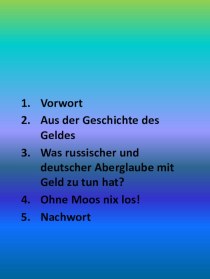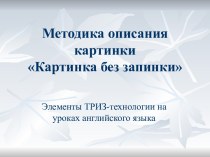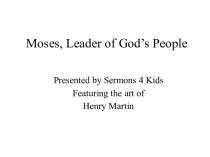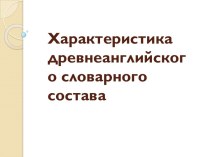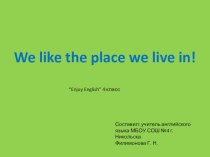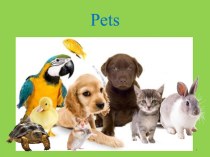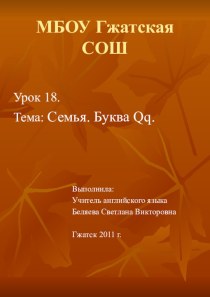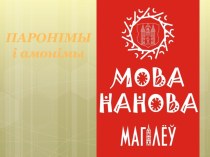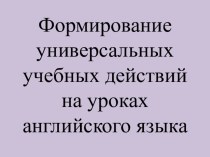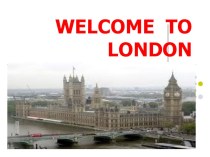- Главная
- Разное
- Бизнес и предпринимательство
- Образование
- Развлечения
- Государство
- Спорт
- Графика
- Культурология
- Еда и кулинария
- Лингвистика
- Религиоведение
- Черчение
- Физкультура
- ИЗО
- Психология
- Социология
- Английский язык
- Астрономия
- Алгебра
- Биология
- География
- Геометрия
- Детские презентации
- Информатика
- История
- Литература
- Маркетинг
- Математика
- Медицина
- Менеджмент
- Музыка
- МХК
- Немецкий язык
- ОБЖ
- Обществознание
- Окружающий мир
- Педагогика
- Русский язык
- Технология
- Физика
- Философия
- Химия
- Шаблоны, картинки для презентаций
- Экология
- Экономика
- Юриспруденция
Что такое findslide.org?
FindSlide.org - это сайт презентаций, докладов, шаблонов в формате PowerPoint.
Обратная связь
Email: Нажмите что бы посмотреть
Презентация на тему The grammatical meaning is a generalized and rather abstract meaning of words, being expressed through its inherent formal features or, in an opposition, through the absence of such
Содержание
- 2. Its very important property is that the
- 3. The grammatical meaning in morphology is conveyed
- 4. Categorial grammatical meanings of number and case
- 5. The grammatical meaning may be : explicit
- 6. Grammatical form is the sum total of
- 7. Types of grammatical formsSynthetic Types. Inflexions (actor,
- 8. Synthetic Types- unite both lexical and
- 9. Sound Alternations- sound alternations are a
- 10. Analytical Types- there two or more
- 11. Suppletive Formations By a suppletive formation we
- 12. Their interrelationsThe Grammatical meaning and grammatical form
- 13. Grammatical form and grammatical category The
- 14. Grammatical form and grammatical category
- 15. Grammatical meaning and grammatical form Grammatical
- 16. Скачать презентацию
- 17. Похожие презентации
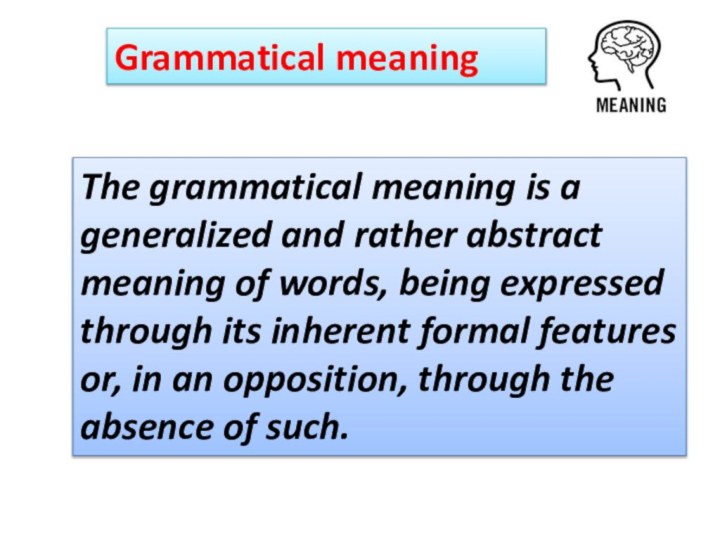
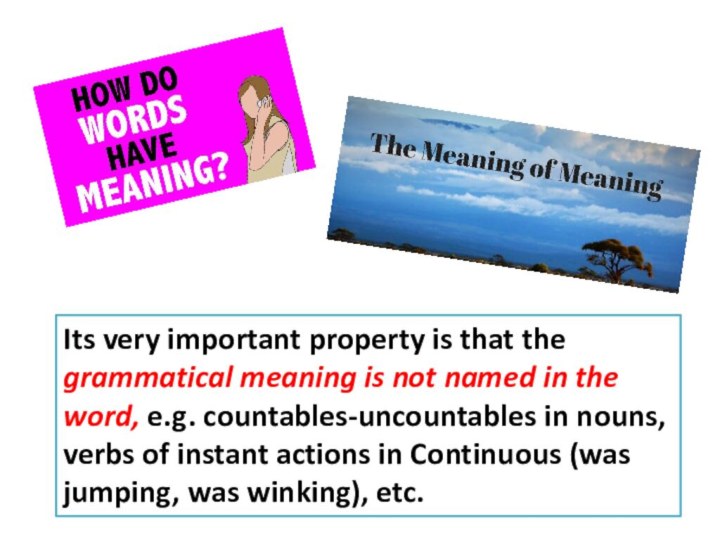
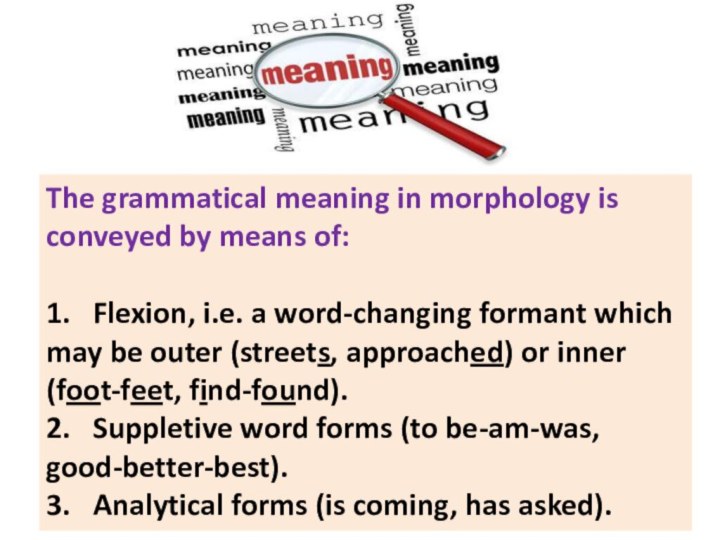
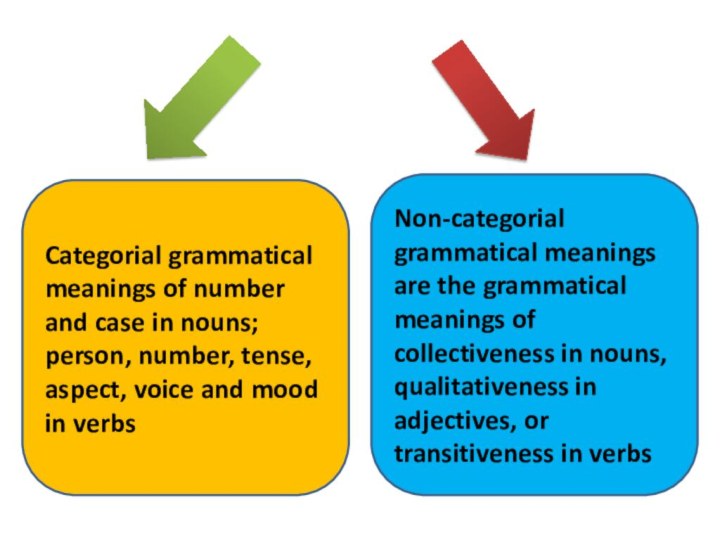
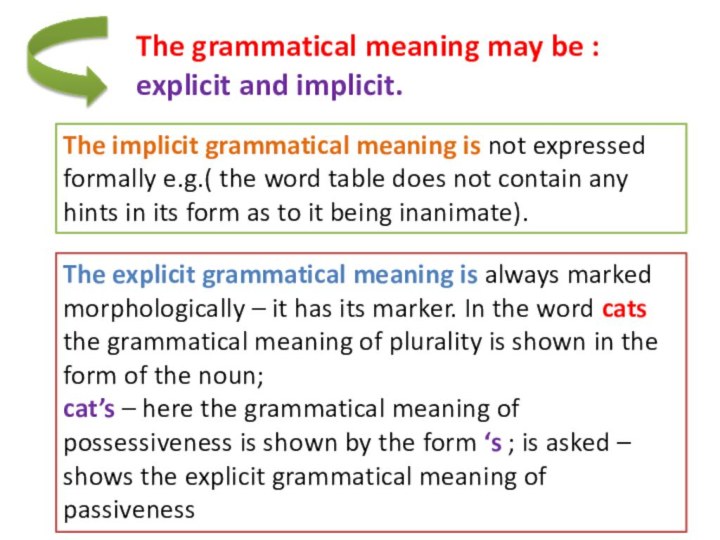
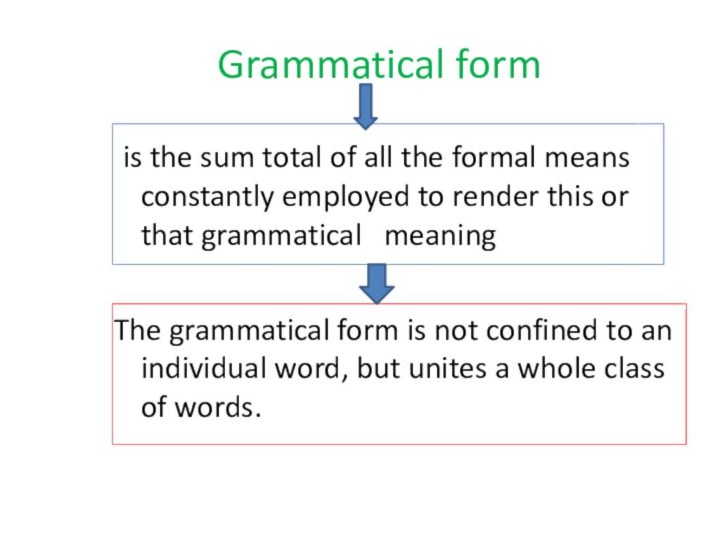
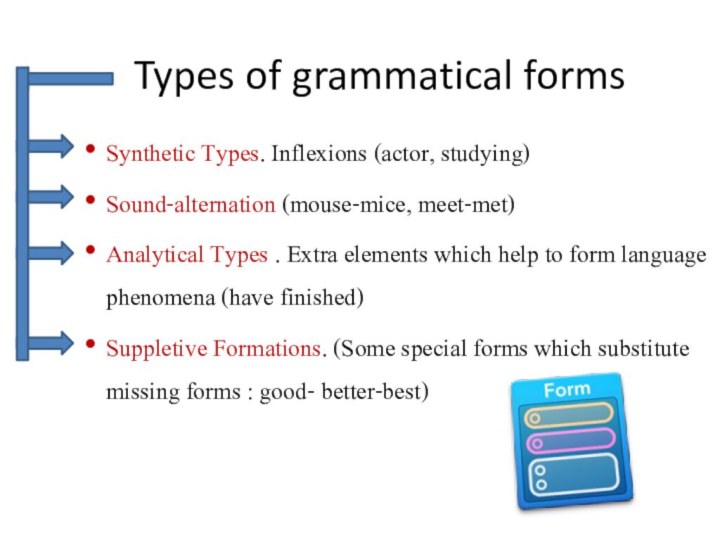
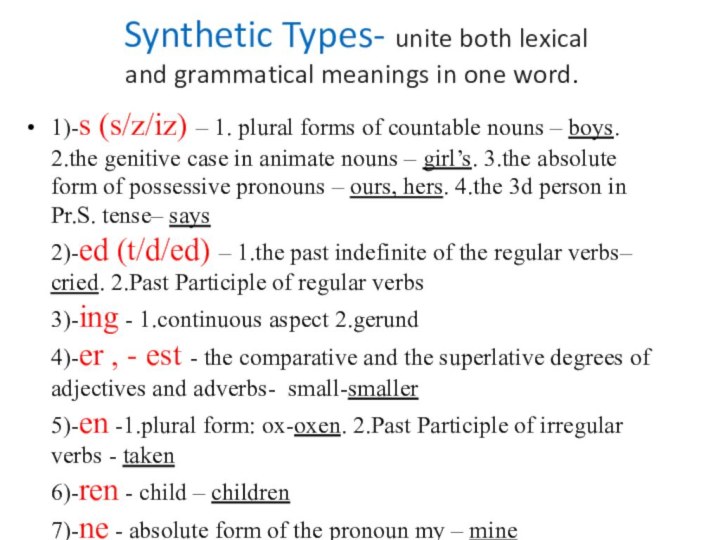
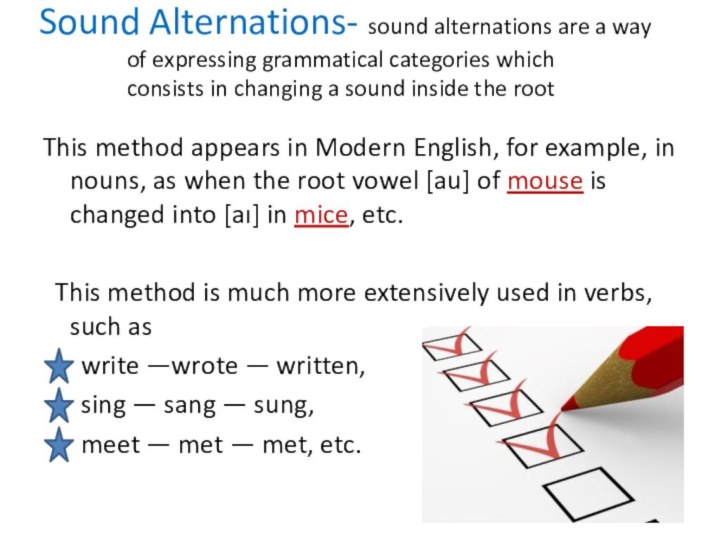
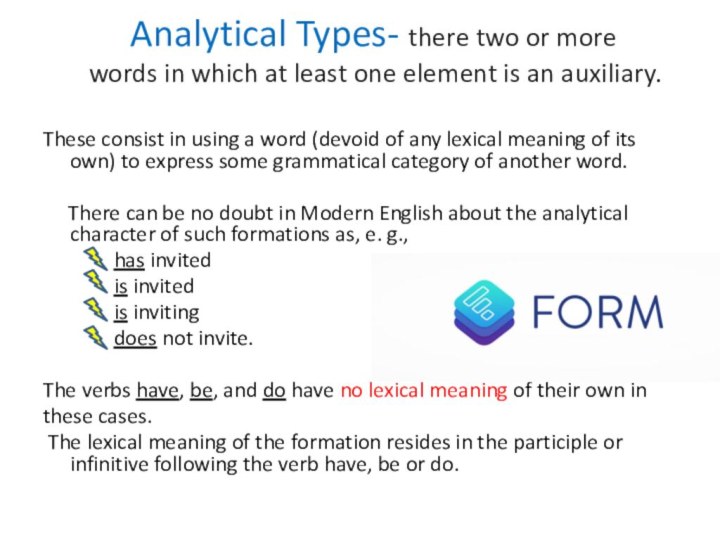
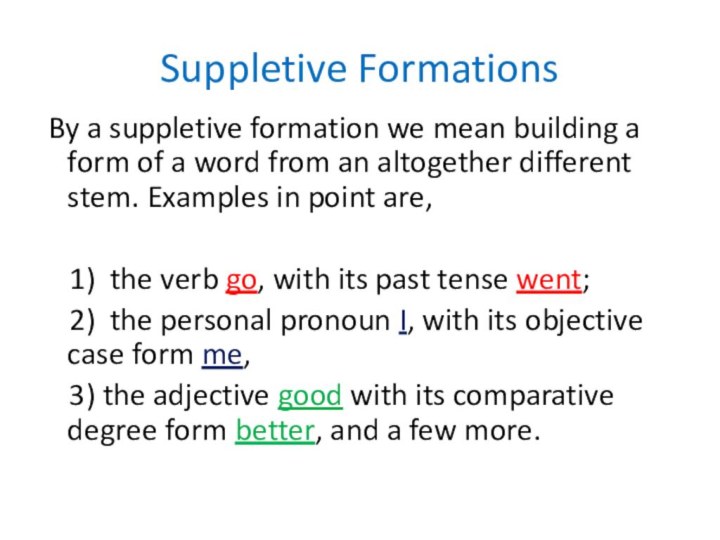
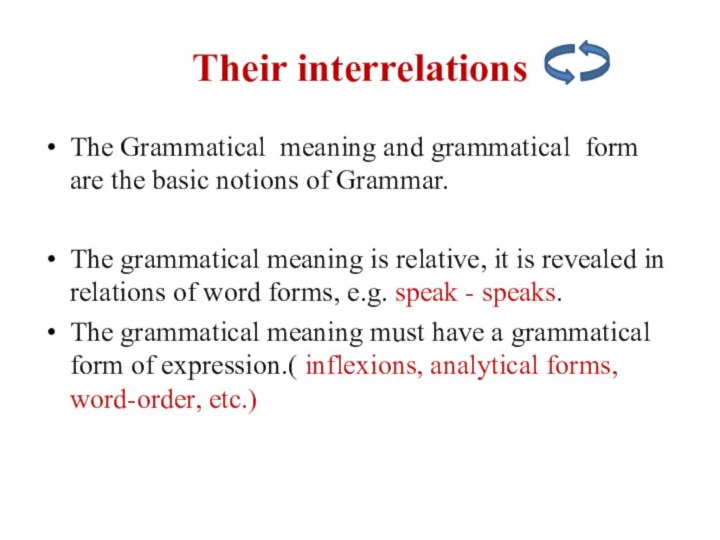
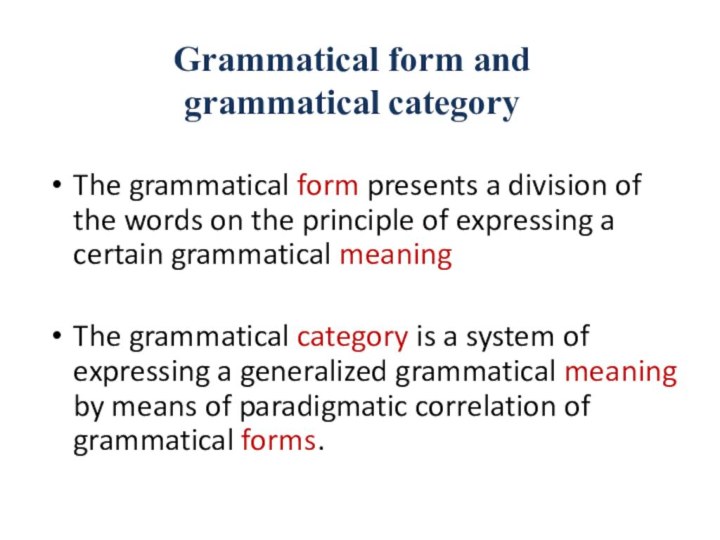
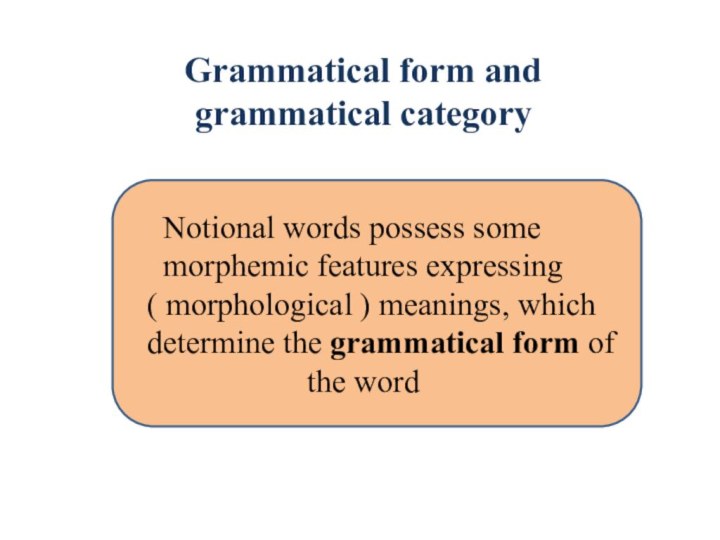
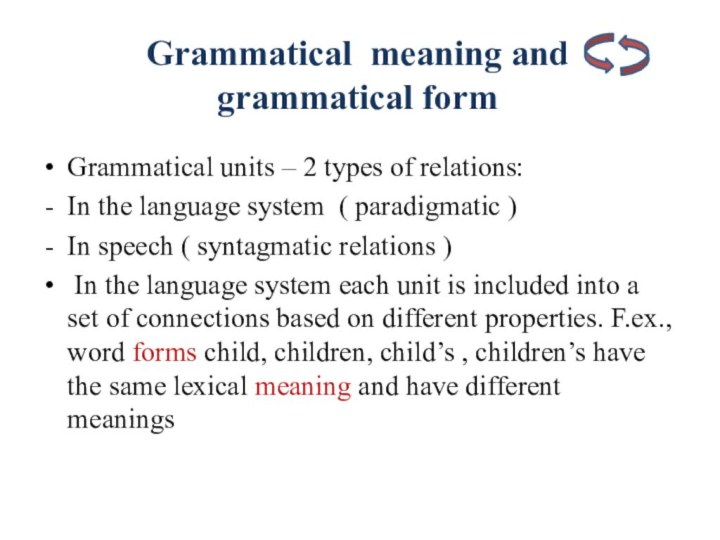

Слайд 3 The grammatical meaning in morphology is conveyed by
means of:
1. Flexion, i.e. a word-changing formant which
may be outer (streets, approached) or inner (foot-feet, find-found).2. Suppletive word forms (to be-am-was, good-better-best).
3. Analytical forms (is coming, has asked).
Слайд 4 Categorial grammatical meanings of number and case in
nouns; person, number, tense, aspect, voice and mood in
verbsNon-categorial grammatical meanings are the grammatical meanings of collectiveness in nouns, qualitativeness in adjectives, or transitiveness in verbs
Слайд 5
The grammatical meaning may be :
explicit and
implicit.
The implicit grammatical meaning is not expressed formally e.g.(
the word table does not contain any hints in its form as to it being inanimate).The explicit grammatical meaning is always marked morphologically – it has its marker. In the word cats the grammatical meaning of plurality is shown in the form of the noun;
cat’s – here the grammatical meaning of possessiveness is shown by the form ‘s ; is asked – shows the explicit grammatical meaning of passiveness
Слайд 6
Grammatical form
is the sum total of all
the formal means constantly employed to render this or
that grammatical meaningThe grammatical form is not confined to an individual word, but unites a whole class of words.
Слайд 7
Types of grammatical forms
Synthetic Types. Inflexions (actor, studying)
Sound-alternation
(mouse-mice, meet-met)
Analytical Types . Extra elements which help to
form language phenomena (have finished)Suppletive Formations. (Some special forms which substitute missing forms : good- better-best)
Слайд 8 Synthetic Types- unite both lexical and grammatical meanings
in one word.
1)-s (s/z/iz) – 1. plural forms
of countable nouns – boys. 2.the genitive case in animate nouns – girl’s. 3.the absolute form of possessive pronouns – ours, hers. 4.the 3d person in Pr.S. tense– says
2)-ed (t/d/ed) – 1.the past indefinite of the regular verbs– cried. 2.Past Participle of regular verbs
3)-ing - 1.continuous aspect 2.gerund
4)-er , - est - the comparative and the superlative degrees of adjectives and adverbs- small-smaller
5)-en -1.plural form: ox-oxen. 2.Past Participle of irregular verbs - taken
6)-ren - child – children
7)-ne - absolute form of the pronoun my – mine
8)-m - the objective case of personal pronouns he and they – him and them Слайд 9 Sound Alternations- sound alternations are a way
of expressing grammatical categories which consists in changing a sound
inside the rootThis method appears in Modern English, for example, in nouns, as when the root vowel [au] of mouse is changed into [aı] in mice, etc.
This method is much more extensively used in verbs, such as
write —wrote — written,
sing — sang — sung,
meet — met — met, etc.
Слайд 10 Analytical Types- there two or more words
in which at least one element is an auxiliary.
These consist in using a word (devoid of any lexical meaning of its own) to express some grammatical category of another word.
There can be no doubt in Modern English about the analytical character of such formations as, e. g.,
has invited
is invited
is inviting
does not invite.
The verbs have, be, and do have no lexical meaning of their own in
these cases.
The lexical meaning of the formation resides in the participle or infinitive following the verb have, be or do.
Слайд 11
Suppletive Formations
By a suppletive formation we mean
building a form of a word from an altogether
different stem. Examples in point are,1) the verb go, with its past tense went;
2) the personal pronoun I, with its objective case form me,
3) the adjective good with its comparative degree form better, and a few more.
Слайд 12
Their interrelations
The Grammatical meaning and grammatical form are
the basic notions of Grammar.
The grammatical meaning is relative,
it is revealed in relations of word forms, e.g. speak - speaks. The grammatical meaning must have a grammatical form of expression.( inflexions, analytical forms, word-order, etc.)
Слайд 13
Grammatical form and
grammatical category
The grammatical form presents
a division of the words on the principle of
expressing a certain grammatical meaningThe grammatical category is a system of expressing a generalized grammatical meaning by means of paradigmatic correlation of grammatical forms.
Слайд 14
Grammatical form and
grammatical category
Notional words
possess some
morphemic features expressing
( morphological ) meanings, which determine the grammatical form of
the word
Слайд 15
Grammatical meaning and
grammatical form
Grammatical units – 2
types of relations:
In the language system ( paradigmatic
)In speech ( syntagmatic relations )
In the language system each unit is included into a set of connections based on different properties. F.ex., word forms child, children, child’s , children’s have the same lexical meaning and have different meanings




